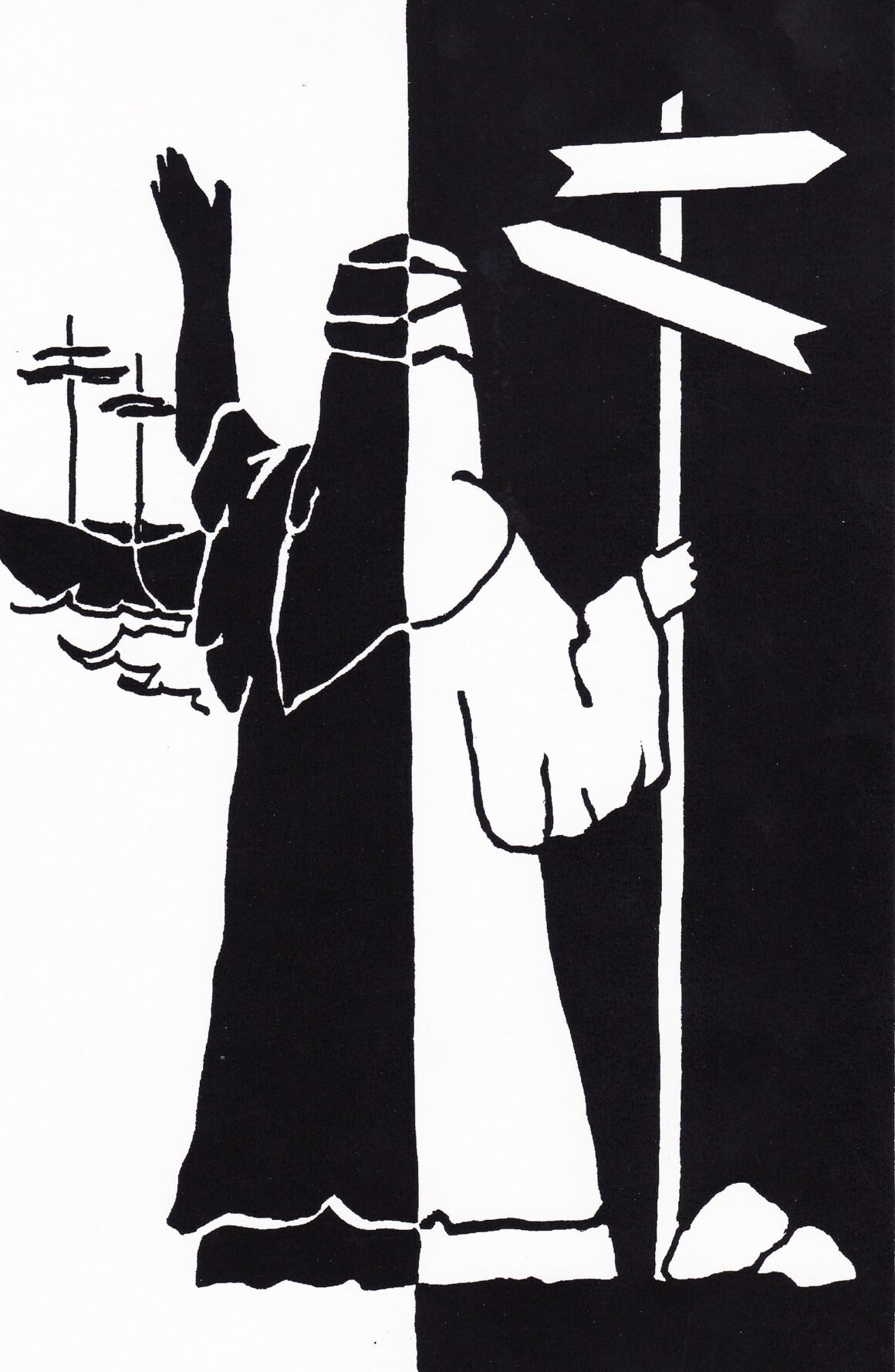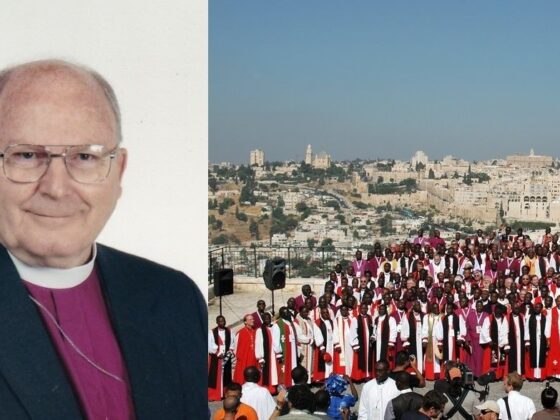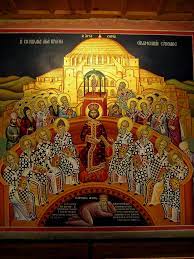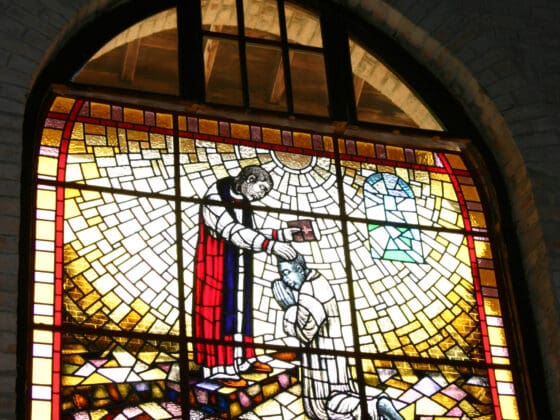This Statement was authorized by the Council of African Provinces in Africa (CAPA). Its drafters are the Most Rev. Nicholas Dike Okoh, Bishop of Asaba and Archbishop of the ecclesiastical Province of Bendel; the Rt. Rev. D. Zac Niringiye, Assistant Bishop of Kampala in Uganda and former Africa Director of the Church Mission Society; and the Rev. Prof. Stephen Noll, Vice Chancellor of Uganda Christian University in Mukono.
The Anglican Communion is at a crossroad. The idea of a crossroad – a meeting and parting of two ways – is woven into the fabric of Scripture. The people of Israel is confronted with the choice of ways – the way of the Covenant or the way of idolatry – and more often than not choose the latter (Jeremiah 6:16). So too Jesus describes a narrow road that leads to life and a broad avenue to perdition (Matthew 7:13). Hence the church must choose to walk in the light and turn from the darkness of sin and error (1 John 1:6-7).
The Church in Africa and the Anglican Communion
We are the voice of the Anglican churches in Africa. We are grateful for our Anglican heritage, brought to us by missionaries inspired by the Scriptures and our Lord’s Great Commission to evangelize the nations. We are equally grateful to be sons and daughters of Africa, whose ancient cultures prepared a rich spiritual soil for the Gospel to blossom. We hope these two inheritances can be kept together, but events of the past decade have called this hope into question.
Although the Anglican Communion came into being at a time of theological and ecclesiastical crisis – the so-called Colenso case – the Lambeth Conference of bishops has by and large managed to avoid doctrinal disputes and disciplinary cases that might have led to controversy and even disunity. Instead the Communion has functioned under the broad umbrella of biblical faith, historic order and Anglican worship, as summarized in the Lambeth Quadrilateral. Although there have been tensions from time to time, e.g., over the ordination of women, most Anglican churches have been content to live with what seemed to be secondary differences. Until now.
At the same time, huge shifts have occurred in the constituency of the Communion and the Lambeth Conference in the past half century. What began as a colonial council of expatriate bishops became at least in theory a parliament of equals. Its members’ complexion changed from all-white and Anglo to largely non-white, Latino, African and Asian. Its Provinces became self-governing. And its evangelical and spiritual dynamism became centred in what is now called the Global South or the majority world. While these changes affected the demography of the Communion, they have not been reflected in its governance, which has stayed put or even gone in the opposite direction. In particular, the advent of the Anglican Communion Office has concentrated power in the hands of those who “pay the piper.” It is, for example, remarkable how few Global South church leaders are appointed to positions of real authority.
The growth of the global Communion has spawned a number of alternative structures. The foremost of these is the Primates’ meeting, which has emerged in the past twenty years as the senate of the Communion. In addition, regional associations and gatherings, such as CAPA, CAPAC and the South-South Encounters are bringing together majority-world Anglicans to address their particular needs.
The Current Crisis
The opposing trends noted above – the growth of the churches of the Global South and the tight control of power by the Anglo-American bloc – came to a head at the Lambeth Conference in 1998. The presenting cause was the acceptance of homosexuality in the Western societies and churches. Despite a determined effort by the Communion bureaucracy to blunt the issue, the Global South bishops managed to get a Resolution to the floor which stated that homosexual practice is “contrary to Scripture” and “cannot be advised.” Resolution 1.10 on Human Sexuality was approved by the Conference by an overwhelming majority.
The importance of this Resolution cannot be overstated. By using the phrase “contrary to Scripture,” the bishops indicated that homosexual practice violates the first principle of the Communion’s Quadrilateral and indeed the fundamental basis of Anglican Christianity (as expressed in Articles VI and XX). They were saying: “Here is an issue on which we cannot compromise without losing our identity as a Christian body.” Such was the understanding of the Global South bishops, and hence they were taken aback when Resolution 1.10 was immediately ignored and denounced by bishops of the Episcopal Church.
In the subsequent Primates’ meetings, the Global South bishops have repeatedly called on the Episcopal Church USA and now the Anglican Church of Canada to repent and bring their practice in line with Scripture and with the mind of the Lambeth Conference. The African attitude toward the actions of the North American churches has been consistent throughout this crisis. It is based on several assumptions:
- the supreme authority of Scripture as the ultimate standard of faith and life (LQ 1);
- the clarity of the Church’s teaching on “the unchangeable Christian standard” of marriage between one man and one woman (Lambeth Resolution 66 [1920]);
- the practice of homosexuality as a sign of fallenness and a sin separating one from salvation (Romans 1:26-27; 1 Corinthians 6:9-11; Ephesians 5:3-5);
- the need for repentance by individuals who sin, even more so for those who teach sin as blessing (Matthew 5:19; 18:6); and
- the requirement for believers not to associate with openly immoral church members (1 Corinthians 5:9-13; 2 Thessalonians 3:14).
The crisis reached fever pitch in 2003 when the Diocese of New Hampshire (USA) elected an openly gay bishop, V. Gene Robinson, the General Convention of the Episcopal Church confirmed him as Bishop, and the Presiding Bishop presided at his consecration. The Episcopal Church could not have sent a clearer signal that it was going its own way, and nothing would stop it.
After the Robinson election, many provinces chose the only instrument of discipline available: declaration of impaired or broken Communion. In February 2004, thirteen Global South Primates, including eight from Africa, denounced the actions of the Episcopal Church as a “direct repudiation of the clear teaching of the Holy Scriptures, historic faith and order of the church.” In April 2004, the CAPA bishops pledged to reject donations from pro-gay American dioceses.
A Word to the Primates and the Archbishop of Canterbury
The principal body through which the churches of the Global South have expressed their distress over these events has been the Primates’ Meeting, where they are well-represented. The Primates of the Global South have not simply denounced the agenda of the North American churches. They have also sought to find a way forward. In 2002, two Primates proposed a careful scheme of inner-Communion discipline (To Mend the Net). The ecclesiastical politicians, seeking to avoid such discipline, managed to get this proposal sidelined.
They could not, however, avoid the storm of protest that followed the Robinson election. In response to this crisis, the Archbishop of Canterbury called an emergency Primates’ meeting in London in October 2003. Many Global South Primates were ready at that point to excommunicate the violators, but in the end they agreed to Archbishop Williams’s plan to form a Commission and receive a Report one year later. From the point of view of the African bishops, the Windsor Report was considered a vehicle by which the offending churches might realize the enormity of their actions and turn back. It was never seen by us as a process that would preempt the decisions of the Lambeth Conference or the Primates. And the Report, while restricted in its scope and cautious in its language, did present a thorough expose of the ways in which the Episcopal Church arrogated to itself unilaterally a practice condemned in Scripture, tradition and the Resolutions of this Communion.
The churches in Africa, while grateful for the overall judgement of the Windsor Report, felt that it often did not go far enough in spelling out the needed steps of repentance and return. As a typical response to the Windsor Report from Africa, we cite from the following statement, signed by more than forty diocesan secretaries and theological educators of the Church of Uganda:
We thank the Lambeth Commission for its work on behalf of the unity of the Anglican Communion. We appreciate its acceptance of Lambeth Resolution 1.10 as the Communion Norm on sexual morality. We understand the difficulties of enforcing discipline across the wide variety of churches of the Anglican Communion. However, we wish to register an African point of view on the following points:
- We believe the role of the Archbishop of Canterbury and any Council of Advice to enforce discipline within the Communion should be exercised only in consultation and in the name of the Primates’ Council and full weight should be given to the views of the majority churches of the Global South.
- We believe the proper response of the Episcopal Church USA to the consecration of Gene Robinson and the authorization of same-sex rites is a formal statement of repentance, the removal or resignation of Robinson from office, and the retraction of all legislation permitting homosexuals to enter into marriage arrangements.
- We believe that the Bishop of Luwero and His Grace the Archbishop of the Church of Uganda were right to come to the assistance of those faithful parishes in the Episcopal Church USA who appealed for support.
- We believe that the Anglican Communion should recognize the Network of Anglican Communion Parishes and Dioceses as the true representative of Anglicanism in the United States until such time as the Episcopal Church USA has repented and reformed its ways.
It is our prayer that true unity of the Spirit and the bond of peace may emerge in our great Communion as a result of godly and biblical discipline.
We in CAPA want to say clearly and unequivocally to the rest of the Communion: the time has come for the North American churches to repent or depart. We in the Global South have always made repentance the starting point for any reconciliation of fellowship in the Communion. We have sought to give time for those who have violated biblical and Communion norms to turn back. Now that time is up. We shall not accept cleverly worded excuses but rather a clear acknowledgement by these churches that they have erred and intend to “lead a new life” in the Communion (2 Corinthians 4:2). Along with this open statement of repentance must come “fruits befitting repentance” (Luke 3:8). They must reverse their policies and prune their personnel.
The current situation is a twofold crisis for the Anglican Communion: a crisis of doctrine and a crisis of leadership, in which the failure of the “Instruments” of the Communion to exercise discipline, has called into question the viability of the Anglican Communion as a united Christian body under a common foundation of faith, as is supposed by the Lambeth Quadrilateral. Due to this breakdown of discipline, we are not sure that we can in good conscience continue to spend our time, our money and our prayers on behalf of a body that proclaims two Gospels, the Gospel of Christ and the Gospel of Sexuality.
We must therefore receive assurances from the Primates and the Archbishop of Canterbury that this crisis will be resolved before a Lambeth Conference is convened. There is no point, in our view, in meeting and meeting and not resolving the fundamental crisis of Anglican identity. We will definitely not attend any Lambeth Conference to which the violators of the Lambeth Resolution are also invited as participants or observers.
We are frankly disappointed that the announced plans of the Lambeth Design Team avoid discussion of Communion order and discipline, which have been clearly strained to the breaking point. We are disappointed that the central issue of an Anglican Communion Covenant is not front and centre on the agenda of the Conference. If any group should be expected to consult on these most important issues, it should be the assembled bishops of the Communion.
A Word to Fellow Churches and Leaders in Africa
At the outset of our Lord’s ministry, he began preaching: “The time (kairos) is fulfilled; the Kingdom of God is near” (Mark 1:15). A kairos moment is a special time when God rotates the hinge of history in a new direction. It may also be called a “crisis” time (krisis), exposing the difference of light and darkness (John 3:19). We believe that such a kairos moment and krisis time have come to the Anglican Communion.
The Church in Africa is also at a crossroad. We are no longer colonial appendages. We say we have come of age. It is for this reason that the first Resolution of the African Anglican Bishops Conference in 2004 states:
that the Church in Africa needs to become self-reliant, just as the Church has been self-governing and self-propagating; through economic self-empowerment, that compels a new orientation and thinking in the area of investment and economic activities.
We the members of CAPA must take forward this Resolution with a unity and seriousness of purpose. Otherwise we shall be continually tempted by those outside our borders who dangle money in return for silence on controversial issues, such as has occurred recently in Malawi and Kenya.
We recognize the strategy employed by Episcopal Church and certain Communion bodies to substitute talk of Millennium Development Goals for the truth of Scripture. These choices are false alternatives: it is the Christ of Scripture who compels us to care for the poor and afflicted. But we must take the initiative in these areas and not accept the patronizing of those who are rich in endowments but who are not rich toward God. Even among the churches on this continent, there are differences in economic resources, in political stability and in religious maturity. It is time for the stronger among us to empathize with and come to the help of the weaker, and not always be looking overseas for help.
It is also a time for reflection and repentance for our churches as well. Our churches must not be unwilling to “listen” and learn to understand better the phenomenon of homosexual attraction. We do not deny that such practices occur in our culture, even that such tendencies will increase as our countries modernize and Western media influences us. We acknowledge our own failures in promoting strong marriage relationships in a traditional culture which allows for polygamy and dehumanizing treatment of women and children. What we are not prepared to do is to suspend the unchangeable standard of God as a part of this conversation. Let the Western churches first affirm God’s plan for the sexes, then let us dialogue.
Conclusion: The Way Forward
We call on our fellow African Anglican leaders to work together in unity to revive our beloved Anglican Communion. We believe that the initiative for the proposed Anglican Communion Covenant should rest with the Global South churches. We do not have confidence that a Covenant produced by those churches that have caused or condoned the theological crisis will reflect the strong biblical and theological core that a reformed Communion needs. In particular, we call on our African churches to lead in sponsoring a Covenant Assembly for the Global South leaders where we may gather and seek God’s guidance for the future of the Communion.
We Anglicans stand at a crossroad. One road, the road of compromise of biblical truth, leads to destruction and disunity. The other road has its own obstacles because it requires changes in the way the Communion has been governed and it challenges our churches to live up to and into their full maturity in Christ. But surely the second road is God’s way forward. It is our sincere hope that this road may pass through Lambeth, our historical mother. But above all it must be the road that leads to life through our Saviour Jesus Christ.
Picture: Jonah by Molly Henning





